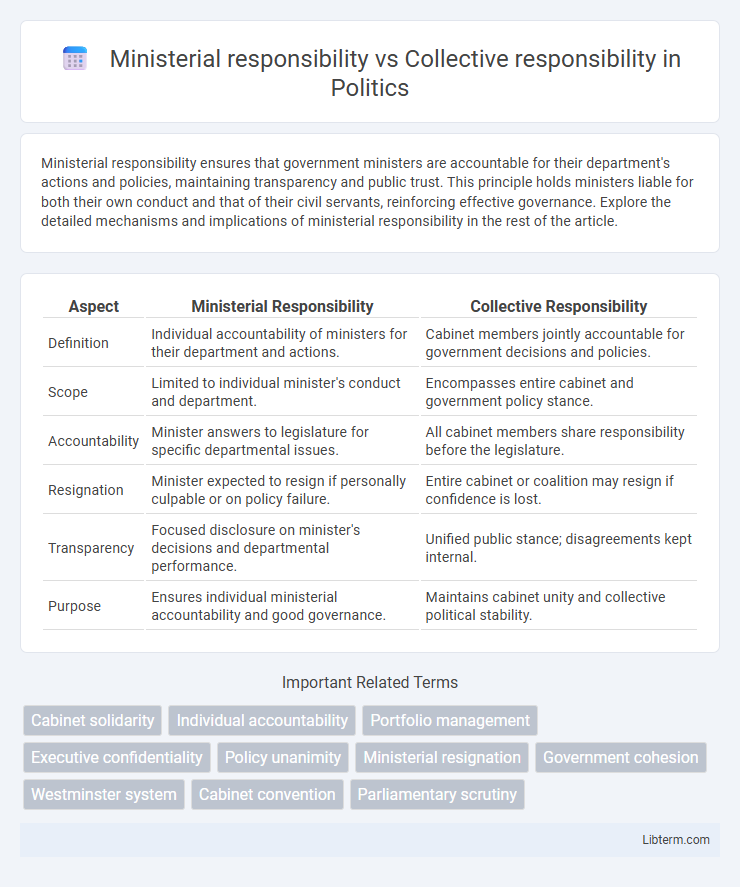Ministerial responsibility ensures that government ministers are accountable for their department's actions and policies, maintaining transparency and public trust. This principle holds ministers liable for both their own conduct and that of their civil servants, reinforcing effective governance. Explore the detailed mechanisms and implications of ministerial responsibility in the rest of the article.
Table of Comparison
| Aspect | Ministerial Responsibility | Collective Responsibility |
|---|---|---|
| Definition | Individual accountability of ministers for their department and actions. | Cabinet members jointly accountable for government decisions and policies. |
| Scope | Limited to individual minister's conduct and department. | Encompasses entire cabinet and government policy stance. |
| Accountability | Minister answers to legislature for specific departmental issues. | All cabinet members share responsibility before the legislature. |
| Resignation | Minister expected to resign if personally culpable or on policy failure. | Entire cabinet or coalition may resign if confidence is lost. |
| Transparency | Focused disclosure on minister's decisions and departmental performance. | Unified public stance; disagreements kept internal. |
| Purpose | Ensures individual ministerial accountability and good governance. | Maintains cabinet unity and collective political stability. |
Understanding Ministerial Responsibility: A Definition
Ministerial responsibility refers to the constitutional convention whereby individual ministers are accountable to the legislature and public for their personal conduct and departmental decisions. It ensures that ministers must justify their actions and those of their departments, maintaining transparency and accountability within government. This principle contrasts with collective responsibility, where the entire cabinet shares accountability for government policies and decisions.
Defining Collective Responsibility in Government
Collective responsibility in government refers to the convention where all members of a cabinet must publicly support and defend decisions made collectively, ensuring unity and accountability. This principle mandates that if disagreement arises, dissenting ministers must resign to maintain the cabinet's unified stance before parliament and the public. Collective responsibility fosters coherent policy implementation and reinforces the executive branch's stability in parliamentary democracies.
Historical Origins of Both Doctrines
Ministerial responsibility originates from the constitutional developments in 18th-century Britain, emphasizing individual ministers' accountability to the parliament for their department's actions. Collective responsibility evolved concurrently, rooted in the cabinet system established during the same period, requiring unified policy support by all ministers to maintain government stability. Both doctrines underpin modern parliamentary systems, reflecting historical shifts towards democratic governance and ministerial accountability.
Key Differences between Ministerial and Collective Responsibility
Ministerial responsibility requires each individual minister to be accountable for their own department's actions and decisions, ensuring direct oversight and personal accountability. Collective responsibility demands that all cabinet members publicly support and defend government policies, regardless of personal disagreement, maintaining government unity and solidarity. Unlike ministerial responsibility, which is individual and departmental, collective responsibility involves the entire cabinet acting as a single entity before Parliament and the public.
Function and Importance within Parliamentary Systems
Ministerial responsibility ensures individual ministers are accountable to the legislature for their department's actions and policies, fostering transparency and effective governance. Collective responsibility mandates that the entire cabinet supports government decisions publicly, maintaining unity and stability within parliamentary systems. Both mechanisms are crucial for democratic accountability, reinforcing trust between the government and parliament while enabling efficient decision-making processes.
Case Studies: Ministerial Responsibility in Practice
Ministerial responsibility is exemplified in the Watergate scandal, where US officials were held accountable for executive actions, demonstrating direct oversight obligations of individual ministers. In contrast, collective responsibility is illustrated by the UK cabinet's unified stance during the 2010 coalition government's austerity measures, where ministers publicly supported shared policy decisions despite private disagreements. These case studies highlight how individual ministerial accountability operates differently from the collective accountability mechanisms within parliamentary systems.
Case Studies: Collective Responsibility in Decision-Making
Collective responsibility in decision-making is exemplified by the UK Cabinet's handling of the 2003 Iraq War, where ministers publicly supported the war decision despite private disagreements, ensuring unified government stance. The Australian government's response to the 1998 waterfront dispute also illustrates collective responsibility, with the Cabinet maintaining solidarity despite internal conflicts during industrial action. These case studies highlight how collective ministerial responsibility enforces public unity in governance, preserving political stability and accountability.
Challenges and Criticisms of Each Principle
Ministerial responsibility faces challenges in ensuring individual accountability since ministers may deflect blame or lack transparency, complicating effective oversight. Collective responsibility often encounters criticism for suppressing dissent within the cabinet, potentially stifling honest debate and leading to groupthink. Both principles struggle with balancing accountability and unity, impacting government functionality and public trust.
Impact on Government Accountability and Transparency
Ministerial responsibility emphasizes individual ministers being directly accountable to the legislature and public for their department's actions, enhancing pinpointed governmental accountability and transparency. Collective responsibility mandates that the entire cabinet stands united behind decisions, fostering a cohesive front but potentially diluting individual accountability and obscuring transparency. This balance impacts how effectively governments are scrutinized, with ministerial responsibility promoting clearer lines of oversight and collective responsibility ensuring policy unity.
Ministerial vs Collective Responsibility: Contemporary Relevance
Ministerial responsibility demands individual accountability of ministers for their personal actions and departmental decisions, reinforcing transparency within governmental operations. Collective responsibility obligates the entire cabinet to support and uphold decisions made collectively, ensuring unity and stability in policy implementation. The contemporary relevance of these principles lies in balancing individual accountability with cohesive governance, crucial for maintaining public trust and effective democratic leadership.
Ministerial responsibility Infographic

 libterm.com
libterm.com